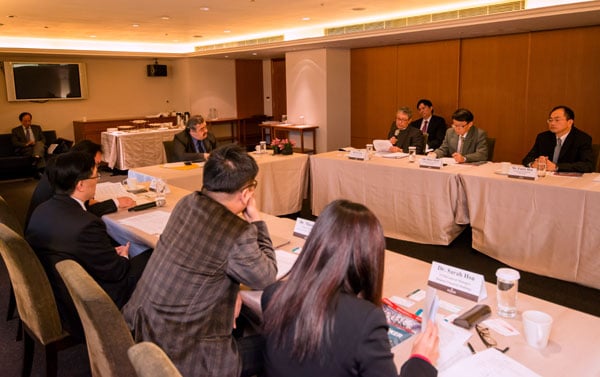ROOM TO GROW
Moderated by Andrea Fiano
At a roundtable in Taipei,
Global Finance
brought together key figures in Taiwans banking and finance industry to discuss the emergence of the country as an offshore renminbi center and other regional economic developments.

Global Finance:
What are the main developments regarding the emergence of Taiwan as an offshore renminbi center?
T.-Y. Lin, director general, economic research department, Central Bank of the Republic of China (Taiwan):
One thing we would like to see is regulations being lifted, so that renminbi payment and settlements become more efficient. This will involve both onshore and offshore funds transfer, including mainland China, Hong Kong and other markets. The central bank would also like to support transactions in different time zones in the future. And we would like to see enlarged transaction volumes and increased liquidity. We are encouraging Taiwans renminbi-clearing bank to solicit more participation in Taiwans offshore renminbi business and more foreign banks to open renminbi accounts in Taiwan.
Also, we would like to have the exchange-rate and interest-rate fixing mechanisms developed to help renminbi financial product development. And we would like to enhance the flowback channels for Taiwanese renminbi funds, which we would need to negotiate with the Chinese authorities. By doing this, for instance, we can offer renminbi lending to Taiwanese firms in mainland China directly. Finally, we welcome both domestic and foreign companies to issue renminbi bonds here in Taiwan, and we would like to see mainland China lift the daily exchange limit of Rmb20,000($3,250).
Oliver Hsieh, chief risk officer, E.Sun Financial Holding:
We have difficulties finding profitable investment opportunities for the renminbi deposits that we receive. Most Taiwanese banks just redeposit a large portion of their renminbi positions in a Bank of China Taipei branch because the fixed deposit rate is more profitable, compared to other opportunities. A lot of Taiwanese banks branches in mainland China can only provide US dollar loans. They have to set up a branch for a couple of years and make profits, and then they are allowed to do renminbi business. We want to digest the renminbi deposits, but because of restrictions or binding regulations we have limited choices right now.
Masson Li, chief economist, Taishin Financial Holdings:
There is very strong demand in Taiwan for renminbi. However, we dont know how to reinvest the renminbi that we collect. Thats a really huge problem for the banks in Taiwan.
Chien-Ting Hsu, senior vice president and general manager, administrative department, Hua Nan Financial Holdings:
Trade invoiced or settled in renminbi is still in its infancy in Taiwan. There are two reasons for this. Firstly, firms need time to adjust their current patterns or habits in making export or import payments. And secondly, a lot of Taiwanese firms or mainland China-based Taiwanese firms handle or make their funds transfers in Hong Kong instead. In terms of experience, Hong Kongs renminbi deposits didnt see a very significant increase until firms were in the game, so Taiwan has to increase the renminbi trade settlement part.
Larry Hsu, senior executive vice president, head of global capital markets group, CTBC Bank:
The ball is in Beijings hands, but a few things can be done in Taiwan. Firstly, we need to enhance the efficiency of settlements. The service provided in Hong Kong is a 24-hour onealthough most of our banks settle before 10PM each day. The 24-hour window is a major advantage for Hong Kong, and it is an incentive for offshore banks to open nostro accounts there.
Secondly, Taiwan has more constraints in launching new products than other centers such as Hong Kong or Singapore. We talk about the liberalization of renminbi products, but the current positive listing regulatory approval process on renminbi products still slows the pace of product innovations that Taiwanese banks can provide, as compared with our rivals in Hong Kong and Singapore. Other financial centers focus their control mechanisms at the banks internal product launch processes instead of the product types themselves. In this regard, we need to be more aggressive in adopting the negative listing regulatory approval process in renminbi products.
Thirdly, we need the rate-fixing benchmark set up so that the banks can utilize the rate as the index or benchmark in designing renminbi products. Lastly, I would like to see more liquidity in renminbi market making in Taiwan. The percentage of the renminbi transactions that remain in Taiwan is less than 1%. More than 99% of the transactions are squared with counterparts in Hong Kong. Perhaps the Taiwanese authorities could give the banks or the brokers some incentives to keep their commercial flows in Taiwan. At the moment, most of the Taiwanese banks cannot find a counterparty here to liquidate their renminbi transactions easily, therefore, Taiwanese banks prefer to square their positions with counterparties in Hong Kong. But if we can bring those flows back to Taiwan, then the market liquidity will be enhanced right away and we can create a more liquid two-way flow in market making to attract more participants to this market.
Tony Phoo, chief economist, Standard Chartered Bank Taiwan:
The tremendous growth of renminbi deposits has been positive but very challenging. Renminbi liquidity, hopefully, someday, will be of a significant size. Currently, Taiwan has less than 20% of Hong Kongs renminbi volumes. We need to build more channels to help the local banks digest and grow renminbi deposits.
We have seen encouraging signs of the buildup of renminbi lending, attracted by the low interest rates here, but that channel is fairly limited. We know local regulators are looking to expand that channel to include other areas of China. That would help local banks create more assets.
Second is bonds. The size of Hong Kongs renminbi bond market is almost 70% of deposits, whereas in Taiwan it is less than 6%, so there is definitely a lot of room to grow.
But there are challenges in growing this market. The higher yields are in Hong Kong, so there is a mismatch in terms of supply and demand. To rectify this is not easy; it has to involve macro mechanisms. The relatively low-hanging fruit would be to open up our retail banking business, which means the creation of wealth management productsinsurance, ETFs, mutual funds. But we still have that Rmb20,000 daily conversion limit. If that limit is removed or lifted, we could see the size of renminbi deposits in Taiwan grow much faster.
Rick Lo, director of macro research, Fubon Financial Holdings:
Things will be quite different this year because since 2005 weve seen the renminbi appreciate about 26% to 27%, and this year it will be down. Under these circumstances, it is quite difficult to encourage people to hold on to their renminbi assets and keep the pool expandingespecially for the offshore market. It will be quite a difficult task for the Chinese government to pursue.
Right now Taiwan has two very important advantages. Firstly, Taiwan has a huge trade surplus with China. In 2013 it was $116 billion, way much more than any other country. And secondly, more than half of Taiwanese households possess foreign currency assets. Besides US dollars, the renminbi is the favored choice.
Taiwanese companies should leverage this advantage and try to negotiate with China to open more flow-back channels.
GF:
Is Taiwan challenging Hong Kongs dominance in renminbi, and to what extent do you see the creation of an offshore renminbi center in Taiwan as an opportunity to attract more foreign investment?
Chien-Ting Hsu:
It may be too ambitious for Taiwan to challenge Hong Kong. Being ambitious is not bad, but we just have to be pragmatic. Taiwan has advantages, including close trade ties with mainland China. Hong Kong ran a trade deficit with the mainland. If this trade flow can be settled in renminbi, Taiwan will accumulate renminbi funds that can be used as the basis for the development of the renminbi offshore business.
The second advantage is that Taiwans financial market mainly serves domestic enterprisesespecially high-tech manufacturers and small and medium-size firmscompared with Hong Kong and Singapore. This is a special advantage that Taiwan can develop and make use of.
Phoo:
Hong Kong has a very strong first-mover advantage, but it all comes down to economic activities. And in terms of either trade or tourism, Taiwan has a strong foundation, so we are not in any way inferior to Hong Kong. The second thing about Taiwan is infrastructure. Taiwan definitely has the talent. What we need is probably a lot more products. Once we have that, we should be able to rival Hong Kong, and with that we will probably start to attract more foreign clients willing to do renminbi business here.
Third is market access. There has to be a way of attracting corporates to set up treasury offices dealing with the renminbi here in Taipei. At the moment, most of this is being carried out in Hong Kong, so we need to provide some incentives for corporations to consider moving or at least shifting some of their treasury business to Taipei. More products, possibly derivatives, would be a plus.
On the retail banking side we have so far not been able to attract foreign residents to consider banks in Taipei. There are tax issues, so it wont be easy, but if we are able to overcome that obstacle, we could one day rival not just Hong Kong but even Singapore in the wealth management part of the renminbi business.
Lo:
Taiwan should not give up or try to compete with Hong Kong or Singapore. We should take a complementary position in the renminbi business.
Larry Hsu:
Most of our Taiwanese customers are manufacturers, whereas in Hong Kong it is mostly real estate or services industries, so we can cooperate with Hong Kong to grow the renminbi market here. By taking a part in the renminbi internationalization plan, the development of the renminbi market in Taiwan will become a means to benefit Taiwans economic and financial markets as a whole in the long run.
Hsieh:
We have to learn from Hong Kong to cooperate with other famous international financial centers. This is just like Hong Kong that cooperates with London to provide global investors with more opportunities to do investment in China.
GF:
What about the macroeconomic situation in Taiwan?
Li:
Based on our estimation, Taiwans GDP growth this year will be around 3.5%, maybe a little higher. The governments estimate is around 2.7% growth in GDP. We believe that the government will spend much more than their estimates suggest because there is an election at the end of this year.
Also, we believe the levels of investment will be much betterespecially in the semiconductor industrythan the government estimates.
Phoo:
We are looking for 3.9% growth in GDP this year. Q4 last year came in at 2.9%, so I think we are seeing upward momentum in economic activity. We are cautiously optimistic in terms of recovery in the United States; we see the US economy growing at 2.5% to 3%. That should benefit Taiwan, and as the Chinese economy stabilizes and is likely to grow 7% to 7.5%, that will benefit Taiwan as well. So we see exports likely to grow at low single-digit numbers. As exports recover, that should help in terms of manufacturing and hiring. Every $10 billion increase in Taiwanese exports adds 25,000 jobs in the manufacturing sector. Tourist arrivals should also help boost retail sales, and with that we should see improvement in hiring.
In terms of risks, apart from China, tapering of quantitative easing in the United States still poses a risk, but as long as the US Federal Reserve keeps to a gradual, steady pace when it comes to tapering, that shouldnt create volatility in the financial markets, and that should keep Taiwan on a recovery path.
Lin:
This year, Taiwans economic performance will be much better; at least 3% growth in GDP will not be too difficult. And the impact of QE tapering will be relatively limited. Taiwan has plenty of liquidity, and the current account is quite healthy. So if the Fed keeps up the current pace of scaling down asset purchasing, it wont have any significant impact on Taiwans performance. Also, consumer confidence is picking up and high-tech manufacturing investments are going to improve this year.
Exports will pick up as well because the United States and Europe are improving. The only concern is Chinas import substitution policy, which will affect some of our exports. Also Asian countries still suffer a lot of turbulence in their financial sectors, and some, like Thailand, still suffer from political conflicts, which may have some impact on the region, as well as on Taiwans economy.
Lo:
Unless we see a significant increase in US capital spending and hiring, Fubons forecast is for Taiwans economy to grow between 2.8% and 3.3% this year. We dont think Taiwanese growth will be very strong this yearespecially when China is slowing significantlyunless US GDP comes back to its long-term potential growth trend above 2.8% or around 3%.
GF:
Taiwanese exposure to mainland China is higher than ever before. What are the risks associated with that?
Lin:
Our exports are concentrated in information and communication technology. We cannot do without mainland China, even though we talk a lot about ideas to diversify exports. The other thing is that Chinas labor costs are increasing, and most of our exports to mainland China are very easy to substitute. So we have to develop more niche products and create more commodities that can be more competitive. Also, some of our products can cut into Chinas marketfor example, agricultural products and transportation infrastructure.
Phoo:
In manufacturing, you have to distinguish between the low-end, low-value producers and the high-end, high-value producers. Theres no doubt recent changes in the landscape in China are making it increasingly difficult for a lot of Taiwanese producers, especially those considered low-value, such as textile makers, shoe makers or apparel producers, that continue to operate from China. We continue to be competitive because the average labor cost structure in China is still lower, as are rental and overall acquisition costs.
However, competition is heating up from mainland Chinese producers in low-value industries. At the higher end, the Chinese market still offers a relatively favorable environment, but were not sure for how long this can be sustained.
Taiwanese export relationships in mainland China will change over time. We will see more investment and more trade, as a result, between Taiwan and Southeast Asia.
On the other hand, China offers opportunities in sectors such as financial, legal and professional services. That should benefit Taiwan in the long term.
GF:
2014 looks to be a year when the relationship between developing markets and emerging markets changes. To what extent could Taiwan be affected?
Chien-Ting Hsu:
We dont have to worry too much about QE tapering because the funds flow into Taiwan were relatively small, compared to [those of] other emerging markets. Therefore, tapering doesnt pose significant risks in terms of capital outflow.
Phoo:
We are far from the scenario of 1997. Most of the economies in Asia have floating exchange rates, so the FX market is able to function in a way that would help cushion some of the consequences of an international liquidity crisis.
Nevertheless, there are pockets of concern, particularly in the property markets in Hong Kong, Singapore and China. But we have seen many governments putting in place measures to mitigate this risk. Obviously, going forward, it all depends on the effectiveness of the measures being introduced.

T.-Y. Lin
is director general of the economic research department at the Central Bank of the Republic of China (Taiwan). He has held various roles at the central bank since first joining in 1988, including deputy director general, adviser, New York office representative and assistant director general. He holds a PhD in economics from the University of Southern California, a masters degree in economics from Oklahoma State University and a bachelors degree in international business from Soochow University in Taiwan.

Oliver Hsieh
is chief risk officer E.Sun Financial Holding. He has corporate-wide oversight responsibility for risk management governance/framework, credit, market, operational, treasury services risk management, model validation and internal control. He was appointed chief risk officer in March 2011. Prior to joining E.Sun in 2000, Hsieh worked at ICBC for 10 years. He has a BA in business administration and industrial management from the National Cheng Kung University, Taiwan, and an MA in applied finance from Macquarie University, Australia.

Masson Li
is chief economist Taishin Financial Holdings, where he directs economic and industrial research. Lis broad research interests encompass macroeconomics, strategic competition among financial institutions and industrial organization. His recent research has focused on the Chinese economy and shadow banking system. Before joining Taishin, Li was an economist and senior consultant at Bates White, an economic consulting firm offering services to law firms, Fortune 500 companies and government agencies.

Chien-Ting Hsu
is senior vice president and general manager, administrative department, Hua Nan Financial Holdings. Before joining Hua Nan in February this year, she worked at Bank of Taiwan as head of economic research department and at the American Institute in Taiwan as a senior economic specialist. Hsu received her PhD in economics from National Chengchi University in Taipei.

Larry Hsu
is senior executive vice president, head of global capital markets group, CTBC Bank. He started his banking career in the late 1980s as a foreign exchange trader at Citibank Taiwan. He joined CTBC Bank in 2003 as director of the debt capital market division. He has a BA in business from the National Taiwan University.

Tony Phoo
is chief economist Standard Chartered Bank Taiwan. He joined the bank in 2007 as an economist and covers Taiwan as well as other regional economies. He was previously senior economist for the fixed income department with Capital Securities between 2003 and 2006. Prior to that, he held similar responsibilities in economic research with DBS Bank and Oversea-Chinese Banking Corporation in Singapore. Phoo has an MA in international economics, banking and finance from the University of Wales, Cardiff.

Rick Lo
is director of macro research, Fubon Financial Holdings. He received his PhD in economics from the University of Pittsburgh. Before joining Fubon Financial in 2005, he was an associate professor of economics at National Dong Hwa University (Taiwan).



